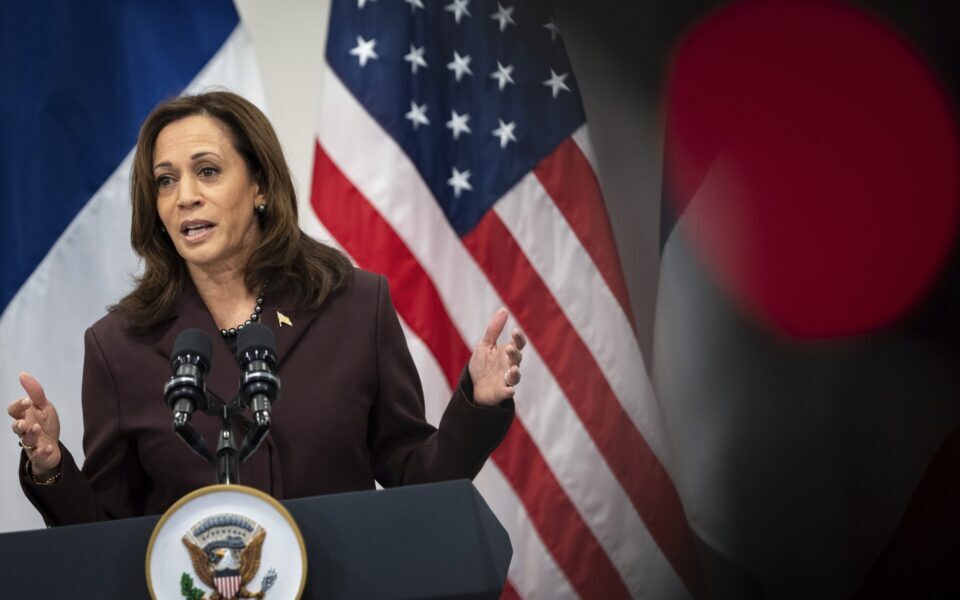What is Kamala Harris’ foreign policy?

In the wake of President Joe Biden’s withdrawal from the 2024 presidential race and Vice President Kamala Harris’ ascension into the role of Democratic nominee, a crucial question emerges: How would Harris’ foreign policy depart from Biden’s?
Biden came into office as the most experienced foreign policy president of our generation. He was a longtime member of the Senate Foreign Relations Committee as a senator, having played a vocal role in national security debates for decades. As vice president, he spearheaded key Obama administration diplomatic initiatives. Harris’ pre-White House resume – career prosecutor, state attorney general, and first-term senator – was decidedly sparse by comparison on the foreign policy front.
However, four years as vice president have provided Harris with a crash course in international relations that few Democrats or Republicans can match. She has received the President’s Daily Brief every morning, sat in on most of Biden’s meetings with visiting heads of state, and been present in the Situation Room when critical national security decisions were made. She has also traveled to more than 20 countries, met with over 150 foreign leaders, and led many key delegations herself – including the past three to the Munich Security Conference.
Through the pandemic, the Afghanistan withdrawal, Russia’s invasion of Ukraine, intensifying great power competition with China, the Middle East war, and numerous smaller crises, the leaders of US allies and partners have come to see her as a steady, capable, and respected hand. Perhaps not as much as Biden, whom they’ve known for decades and – in many cases – grown fond of, but certainly more than former president Donald Trump.
But how does her worldview, and by extension, her policy preferences compare to Biden’s? There is plenty of overlap but also significant daylight between them.
Biden, 81, came of age during the height of the Cold War, and his worldview reflects that. He is a strong believer in “American exceptionalism” and sees international relations in black-and-white terms, as a struggle between democracies and autocracies where the United States is always a force for good. Biden is also a believer in the “great man” theory of politics, which posits that statesmen such as himself can alter the course of history through personal relationship-building and sheer force of will.
By contrast, the 59-year-old Harris grew up in a post-Cold War world where the greatest challenge to American hegemony was a failure to uphold its ideals at home and abroad. Her inclination as a prosecutor is to judge countries by their adherence to the rule of law and international norms rather than their political system or leaders. She views Biden’s “democracies vs autocracies” framework as reductive and hypocritical, acknowledging the necessity (and reality) of US engagement with non-democratic nations as well as America’s own democratic shortcomings. Though agreeing with Biden that the US is generally a force for good, she is wary of unintended consequences and favors institutionalist and multilateral approaches over unilateral interventions. Harris believes the most effective way for America to exercise power in a more contested and multipolar world where the US is still the global hegemon but lacks the ability, the will, and the legitimacy to dictate outcomes in the way it once did is to lead by example.
These contrasting worldviews manifest differently across policy areas.
On China, continuity is the order of the day, as US National Security Adviser Jake Sullivan explicitly assured Chinese leader Xi Jinping in a rare meeting. Biden and Harris are fully aligned on engaging with Beijing wherever cooperation is possible while competing vigorously but in close coordination with allies on national security-related issues. Any differences in policy between them are likely to be just a matter of emphasis or tactics. As vice president, for example, Harris expended considerable effort in shoring up America’s Indo-Pacific relationships, traveling five times to Asia and meeting regularly with Philippine President Ferdinand Marcos Jr. Her administration would prioritize alliance-building over unilateral measures (such as tariffs, export controls, and sanctions), intensifying the “pivot to Asia” beyond Biden’s and certainly Trump’s approaches.
The Russia-Ukraine war is a different story. Harris and Biden align in supporting Kyiv, but their motivations differ. Whereas Harris sees the conflict in legal terms, emphasizing Russia’s violation of Ukrainian sovereignty, Biden views it through a moral lens, casting it as a struggle between democracy and autocracy. This underlying difference in perspective could lead to policy divergence under changing circumstances. While Harris would accept a bilateral ceasefire agreement, she would be less likely than Biden – whose personal relationship with Ukrainian President Volodymyr Zelenskyy is tepid at best – to pressure Ukraine into unwanted negotiations, especially while Ukrainian territory remains under illegal occupation.
The Israel-Palestine issue marks their most significant foreign policy divide. Harris is more sensitive to alleged Israeli violations of international law in Gaza and the West Bank committed with US complicity. She’s also generally more supportive of the Palestinian statehood claim than Biden, who nominally favors a two-state solution but has been all too deferential to the far-right Israeli Prime Minister Benjamin Netanyahu. While Harris would continue to recognize Israel as America’s most important regional security partner and ensure its ability to defend itself, she would exert more pressure on its government to uphold the rule of law. This tightening of the “special relationship” would represent a break from the past but align US policy more closely with most allies’ stances.
As the November 5 election nears, Harris’ potential to shape global affairs for the next 4-8 years becomes increasingly significant. Though often aligned with Biden, her unique worldview promises distinct leadership on the international stage. As we navigate an increasingly complex global landscape, understanding just how US foreign policy might shift under a Harris administration is not just important – it’s imperative.
Ian Bremmer is the president and founder of Eurasia Group and GZERO Media.





